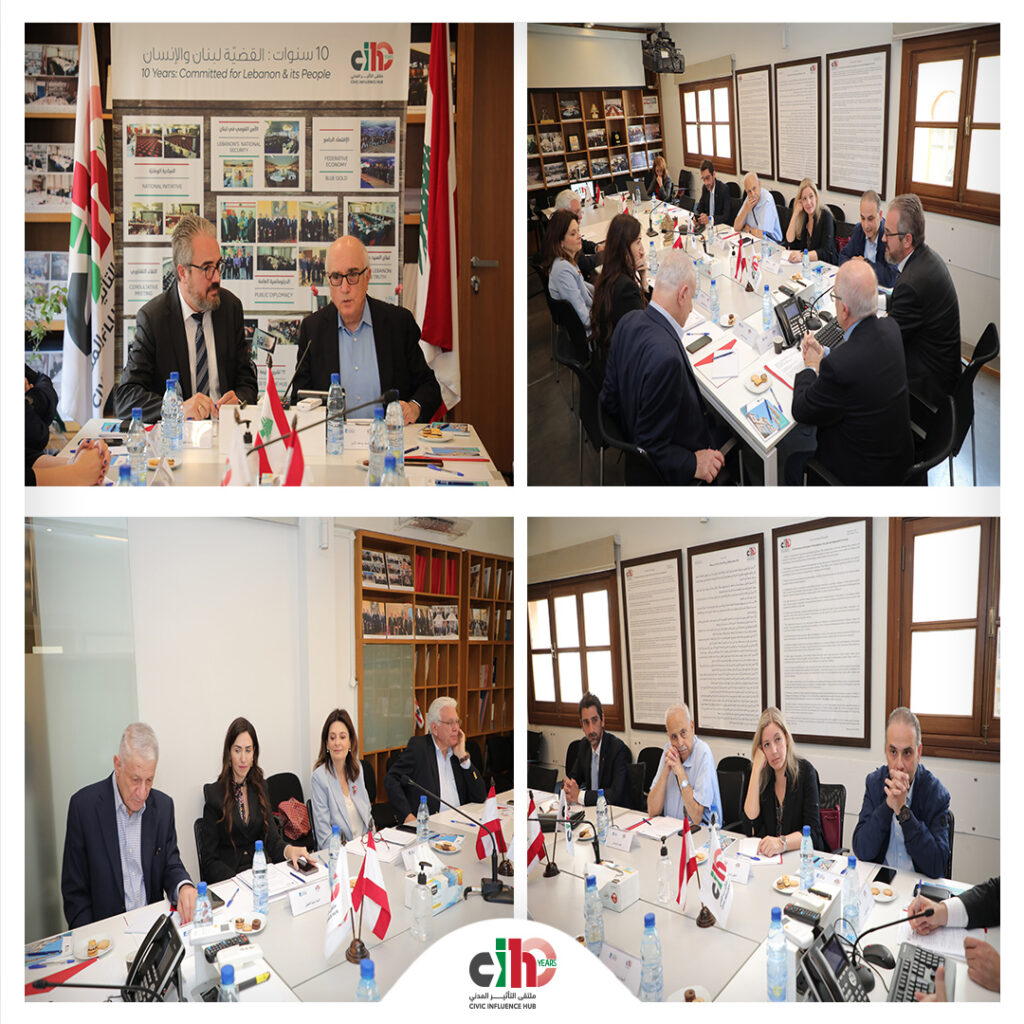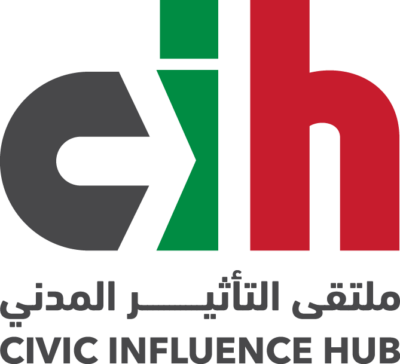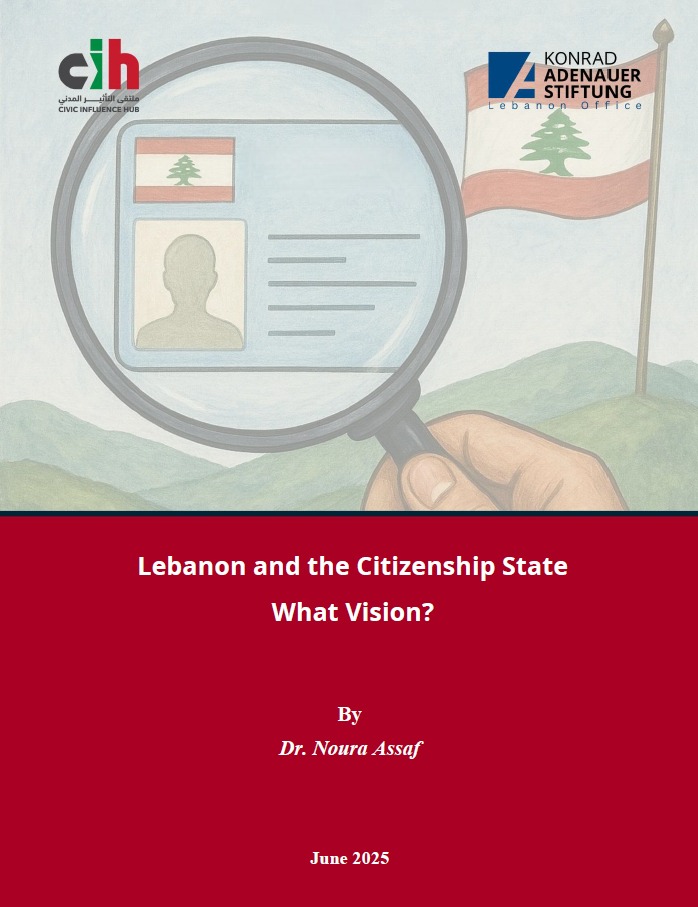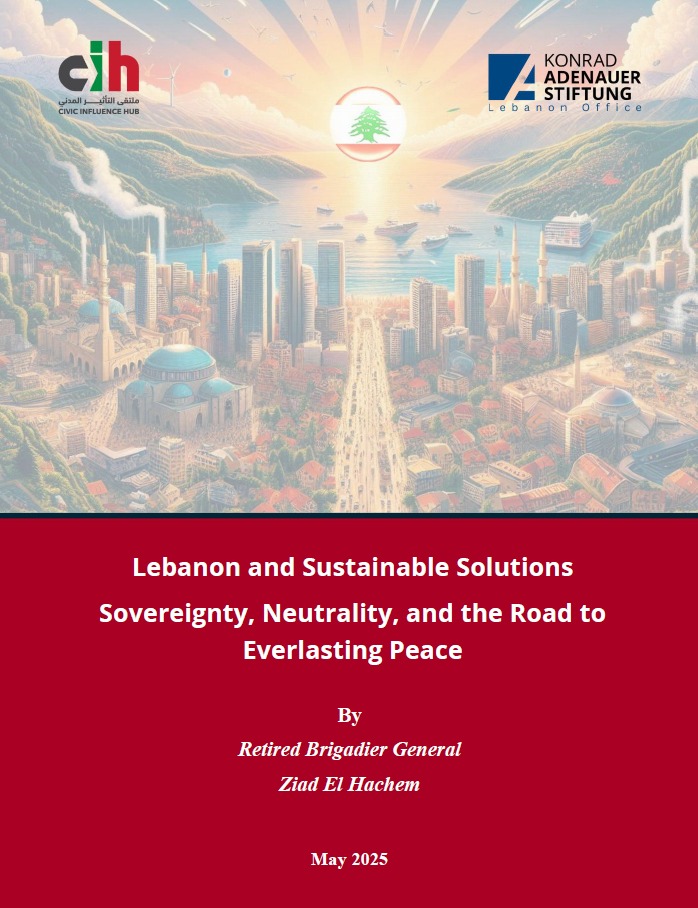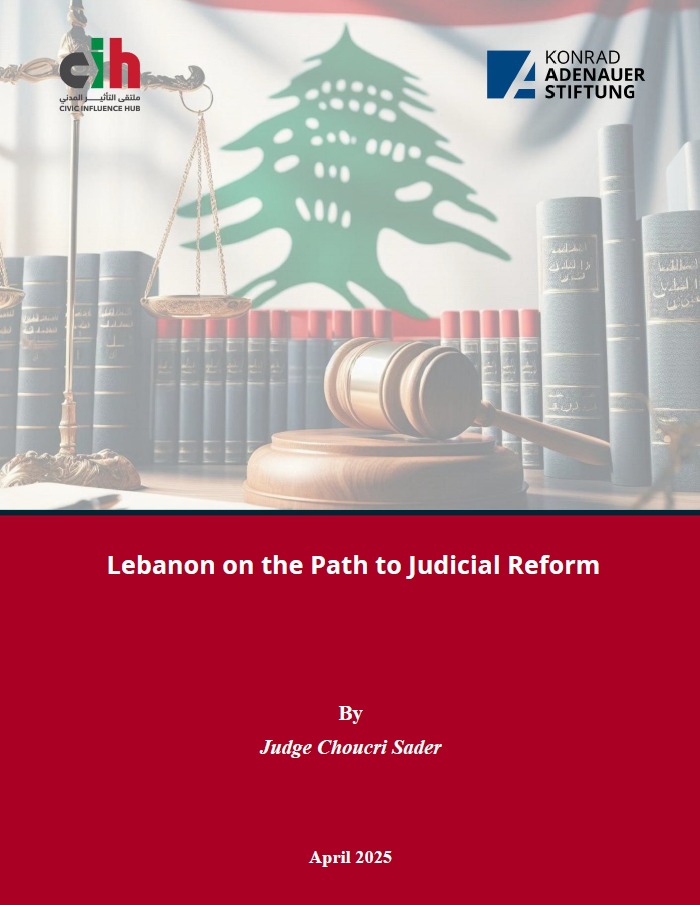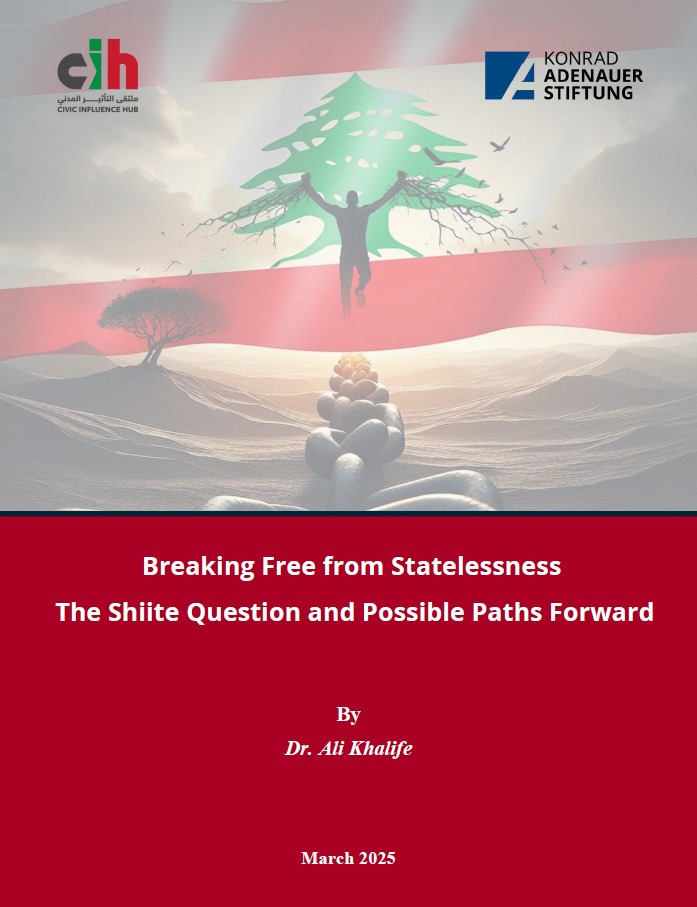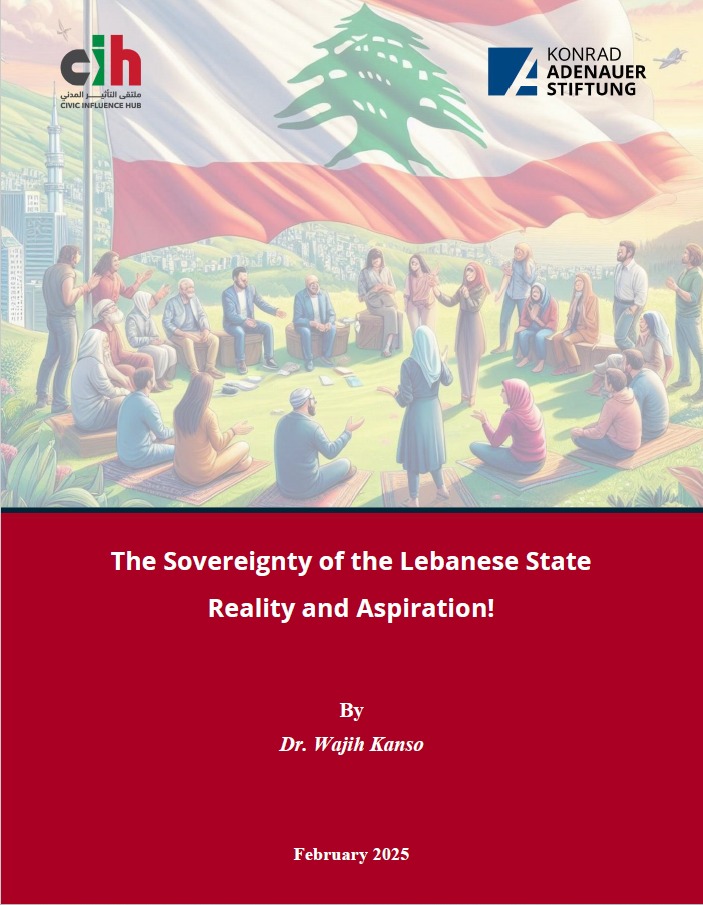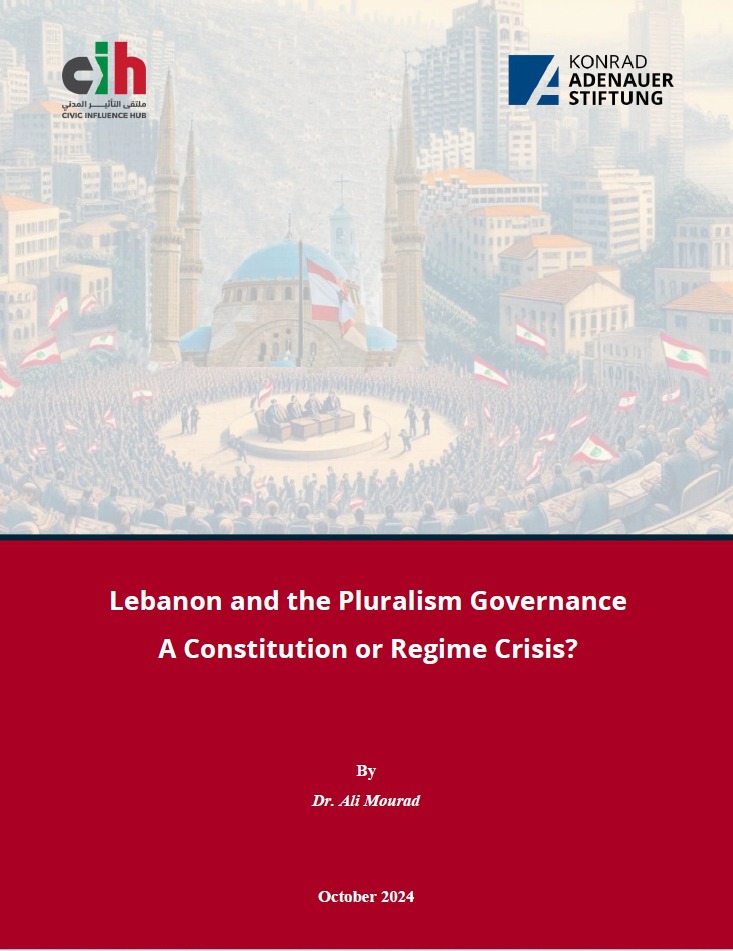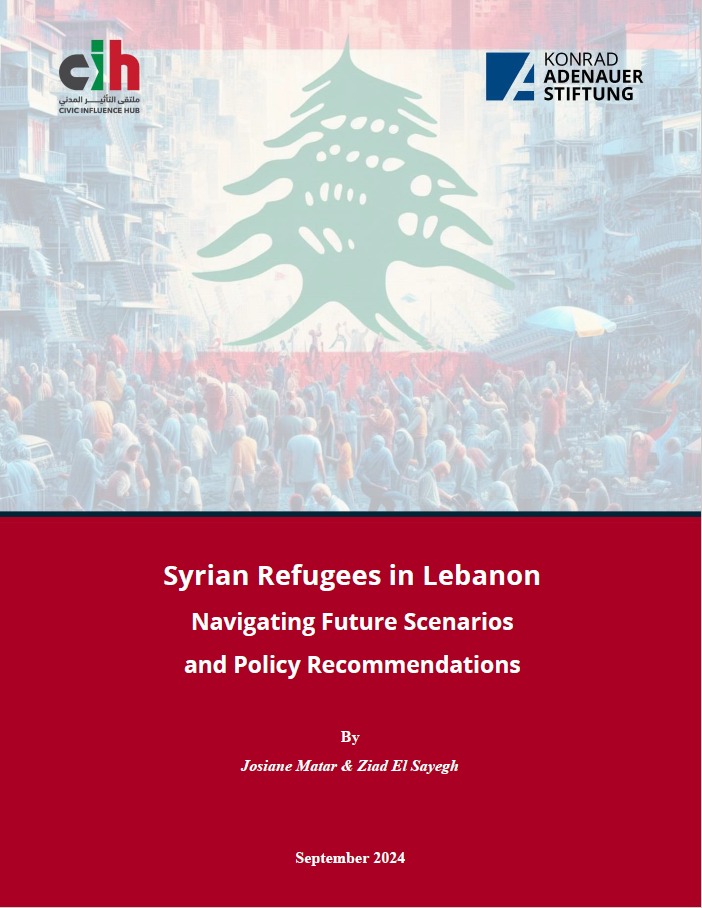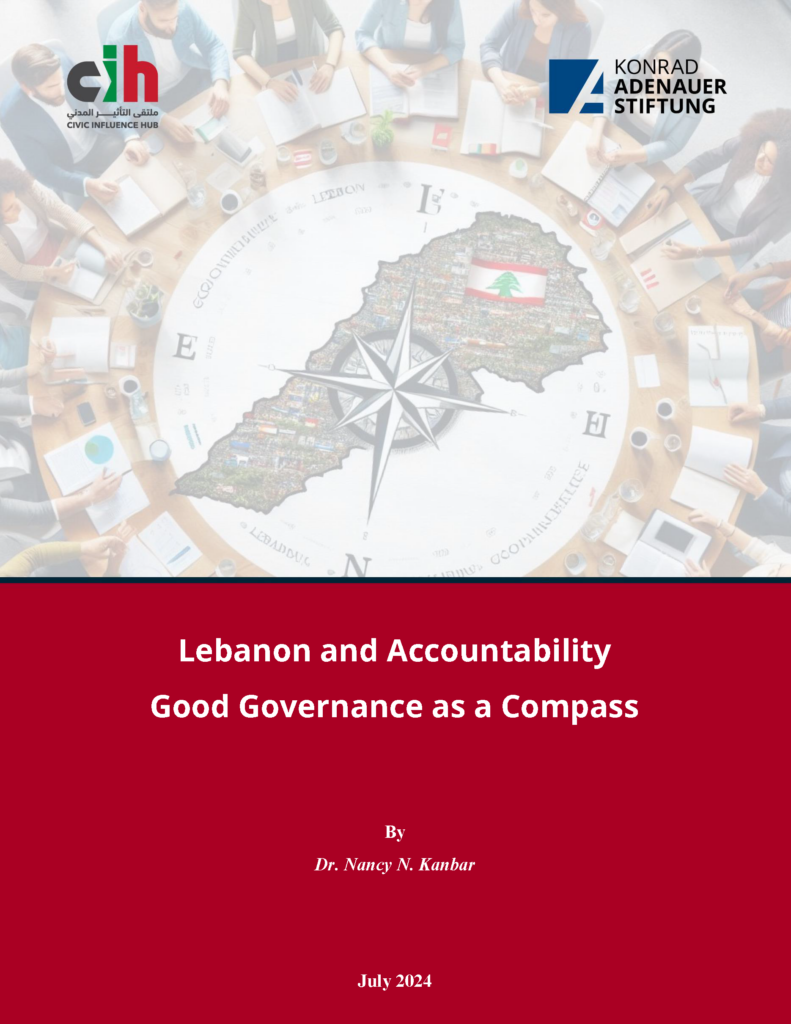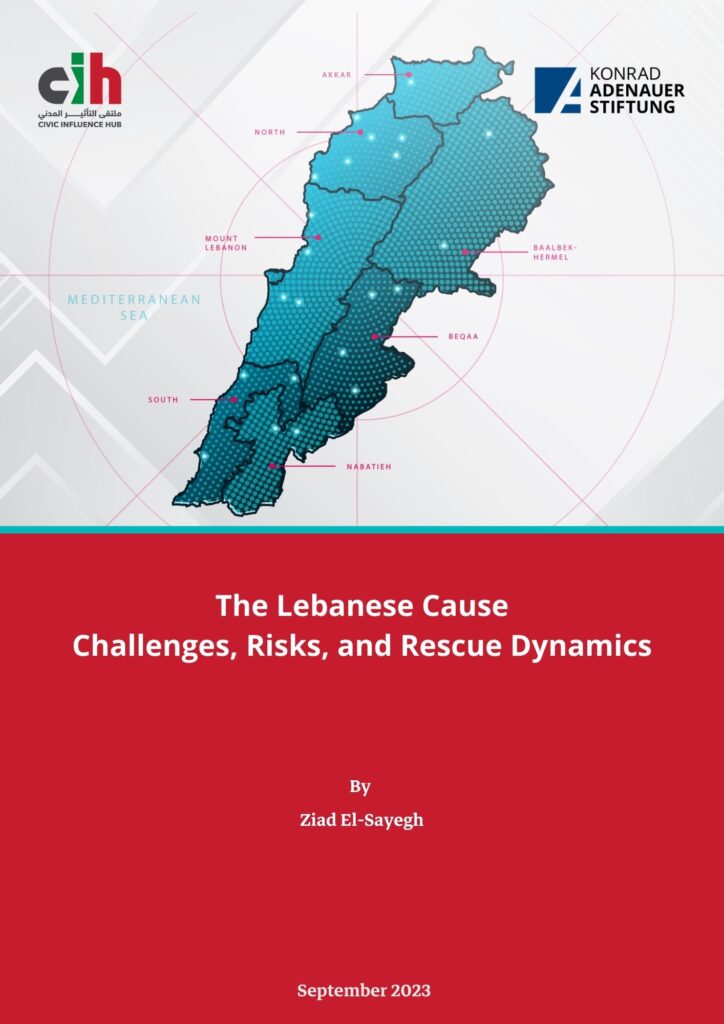Lebanon and the Citizenship State: What Vision?
Lebanon and Sustainable Solutions: Sovereignty, Neutrality, and the Road to Everlasting Peace
Lebanon on the Path to Judicial Reform
Breaking Free from Statelessness: The Shiite Question and Possible Paths Forward
The Sovereignty of the Lebanese State: Reality and Aspiration!
The Evolution and Characteristics of Nation-States: A Case Study of Lebanon
Decentralization and Federalism: Which Path to Lebanon’s Salvation?
Lebanon and the Pluralism Governance: A Constitution or Regime Crisis?
Syrian Refugees in Lebanon Navigating Future Scenarios and Policy Recommendations
Lebanon and Accountability Good Governance as a Compass
The Lebanese Cause Challenges, Risks, and Rescue Dynamics!
“Lebanese Challenges: Citizenship and the State, Sovereignty and Foreign Policy“
Closing Conference
24/07/2023
Press release
Lebanese Challenges: Citizenship and the State, Sovereignty and Foreign Policy.
Proceedings of the dialogue conference organized by the Civic Influence Hub and Konrad Adenauer Foundation – Lebanon
The conference organized by the “Civic Influence Hub” and “Konrad Adenauer Foundation – Lebanon” took place this morning (24/07/2023) at the Movenpick Hotel in Beirut under the title: “Lebanese Challenges: Citizenship and State, Sovereignty and Foreign Policy” with the participation of 50 female and male experts and a remarkable diplomatic and media presence.
Its facts were diffused directly on the social media platforms of the Hub and the Foundation throughout the day. The convening of the conference was based on the need to “confront the main challenges that Lebanon faces at the level of public policies”, especially in terms of “the disruption of the establishment of a State of citizenship due to the failure to implement the constitution, as well as the fragility of successful sovereignty and the confusion in foreign policy.”
El-Khalil
The conference was opened with the Lebanese and German national anthems. After that, there was a minute of silence to mourn the lives of the victims of the Beirut port bombing, then the head of the Civil Influence Hub, Faisal El-Khalil, delivered a speech that he started by welcoming the attendees, he spoke highly of the partnership with the “Konrad Adenauer Foundation – Lebanon” to address “problematic issues in public policies that are lacking in Lebanon, on a well-defined track through which we deal with experts whom we thank and appreciate”.
El-Khalil added, “It is not easy at this dangerous and delicate stage in which Lebanon is facing a great threat to its identity, entity, sovereignty, justice and the State’s culture and constitution”, it is not easy for all of us, citizens, residents and expatriates, each from his position, to create hope in cooperation with our brothers in the Arab world and the international community. Lebanon is a founding member of the League of Arab States and the United Nations, and it has deeply contributed to the drafting of the Universal Declaration of Human Rights. Creating hope is our decision and it is irrevocable for the sake of restoring the State, implementing the constitution, achieving sovereignty, preserving the human being dignity and strengthening the living together in the country of freedom and brotherhood”.
Michael Bauer’s
After that, Michael Bauer, Head of the Konrad Adenauer Foundation in Lebanon, said: “Lebanon is a land of unique beauty, and its people are distinguished by their steadfastness throughout the course of time because of the challenges they faced. One of the most important challenges may be the citizenship and the State, as they lay the foundations for the future of any nation. Citizenship is the beating heart of any democratic society”. Bauer added: “With citizenship, there is a challenge of monopoly in the use of force amid the State’s sovereignty over its entire land and borders, and this is what Lebanon faces as the fundamental challenge. Lebanon’s foreign policy is affected by the involvement of parties in conflicts outside Lebanon”. Bauer concluded: “With all these challenges, the problem of identity and the role of Lebanon in the future remain, and this is essential”.
1st session: Citizenship and Collective Memory
After the opening session, the first session was held under the title “Lebanon and the State of Citizenship: Addressing Challenges in Collective Memory and Social Cohesion”. Mrs. Hoda El Khatib Chalak and Dr. Hassan Mneimneh spoke in this session that was directed by the political writer, Sam Menassa and the executive Director of the CIH, Ziad El Sayegh, who said: “Lebanon is a country separate from the constitution which was caused by a murderous regime in which illegal corruption allied itself with weapons that go beyond legitimacy; It took it out of the natural and situational order, and forced its people into suicidal choices in which concepts were ambiguous, the paths were demonized and the hope was assassinated. We all became trapped in a whirlpool of unprecedented violence enveloped with a fragile calm. Despite all of the above, and longing for a sovereign, free, just and independent State of citizenship is the basis, and there is no appeasement in this struggle. Hence the importance of approaching the problems of the State of citizenship in connection with the challenges of building a collective memory and social cohesion, which is the title of the first session.
El Khatib Speech
El Khatib began by referring to Article 1 of the Lebanese Constitution, the sense of “being a citizen of Lebanon” and the way “the Lebanese deal with the remnants of the past, from sectarianism and mistrust, wars, destruction and sustainable instability to “what is left in the memory of the Lebanese people from these wars”. What nurtures the State’s deteriorating reality today at all levels is the fragility of the collective memory” and she asked “if there is citizenship that is built on the quicksand of a collective memory that has not been dealt with?”. She considered that “when this citizenship arises among Lebanese women and men and the challenges we face in light of the loss of the constants that unite the Lebanese, Lebanon is “more than a homeland, it is a message”, and she drew attention to how the Lebanese translate “what the Synod recommended for the Lebanon of the Lebanese”.
After that Mrs. El Khatib asked if “the Lebanese have benefited from past lessons”, and she made a comparison between “the current scene of the State of citizenship in Lebanon and the desired scene” she referred to a set of “mechanisms proposed in Lebanon to achieve the citizenship of its people and its distinctive historical message in terms of implementing Taif as a necessary transitional stage, a fair election law, a fair judiciary, education on citizenship and instruction, creation of work markets, investing in the Lebanese individual and the brain drain, activating the role of women, raising awareness and training on citizenship and democracy, especially for young people, social security and human security”.
Mneimneh
As for Mneimneh, he spoke about “Memory between unity and plurality, between the past and the future”. He focused on the subject of “the memory of the Lebanese is not about the past as much as it is about the future in the context of the deep existential crisis that Lebanon is going through”. He said that: “the status quo, even without general acknowledgment thereof, is that the Lebanese memory is not one memory and the vision for the Lebanon’s future is also not the same. How can Lebanon benefit from the experiences of others to take the rough path of dealing with memory with its problems, not towards uniting it if the matter is difficult, but rather to achieve coexistence between its multiple manifestations. The main question is whether the memory can remember to become part of the solution in the considerations of the future of Lebanon or is it condemned to remain a facet of the problem”.
2nd Session: Foreign and Defense Policy
After a general discussion for half an hour, the second session was held under the title “Lebanon’s Defense Strategy and Foreign Policy: Exploring Scenarios and Implications”. Dr. Rayan Assaf and retired Brigadier General Khalil El Helou delivered speeches. The session was managed by Menassa and El Sayegh, who introduced it by saying: “The repercussions of derailing Lebanon from the constitution imposed perpetuating the violation of the sovereignty and the legitimization of violence and strategic choices from outside the State, which laid the foundations for a rush of search of an ambiguous defensive strategy on the one hand, and placing Lebanon’s in an unbalanced and unstable foreign policy, in which the policy of axe(s) was forcibly inserted, which made its foreign policy turn against its historical choices on the other hand; hence the importance of approaching the defense strategy and the foreign policy with its scenarios and repercussions.
Assaf
In her intervention, Dr. Assaf said, “One of the means of managing pluralism may require neutrality, and from this standpoint, Lebanon has declared throughout its history and carried out procedures that express its tendency to adopt neutrality”. Assaf pointed out “the use of the expressions of neutrality, neutralization and disassociation in public debates in Lebanon without distinguishing between them in order to express a penchant, in the midst of all the conflicts in the region, to distance Lebanon from these conflicts”.
Assaf pointed out that “there is a difference between these concepts. In general, the concepts of neutrality and neutralization express a general policy that the Lebanese State adopts to distance Lebanon from conflicts”. As for “disassociation, it is a decision to exclude Lebanon from a specific conflict that is not directly related to Lebanon. Neutrality and neutralization assume that Lebanon distances itself from conflicts, and that the countries involved in the conflicts commit to distance it from their conflicts. As for disassociation, it is a unilateral decision taken by Lebanon without any commitment on the part of other countries”. ASSAF spoke about “the difficulty of transitioning, at the present time, to a position of permanent neutrality subject to a tight legal system as a result of several internal and external considerations, especially on the internal level, for the reason that Lebanon is committed to the Palestinian cause and because Lebanon still has occupied lands in Kfar Shuba, Shebaa, and the eastern part of the town of Ghajar”.
Assaf concluded by calling on “the Lebanese State to commit itself to disassociating Lebanon, as stated in Baabda Declaration, which is in the document of Baabda Declaration approved by the United Nations General Assembly and the Security Council No. A66/849 dated June 21, 2012 that contained principles agreed upon by the Lebanese dialogue table on June 11, 2012, and working to fortify this consensus and strengthen its recognition by the countries concerned.
Brigadier General El Helou
As for Brigadier General Khalil El Helou, he said that “because of the permanent instability in the Middle East for centuries and its negative impact on Lebanon, and because of its geographic location and the plurality of its people, stability must be secured through a strong and developed central army, and this is possible with the support of friendly countries which find that their interests are in the stability of Lebanon, and in preventing the transformation of Lebanon into a launching pad for subversive actions against them.”
For this purpose, El Helou considered, that “a defense policy must be put in place in the Council of Ministers and the House of Representatives by their natural components including all ministries, together with the Ministry of Foreign Affairs, the Ministry of Defense and the ministries of services. A defensive strategy and then a military strategy will emerge therefrom, based on a doctrine grounded on three elements: the first is preventing any Lebanese or non-Lebanese party from attacking the Arab and non-Arab countries of the region without exception, the second is to prevent interference in its internal affairs and implement the Armistice Agreement with Israel (1949) and the Security Council Resolution 1701; the third is to confront any aggression across all borders, by adopting asymmetric (delayed fighting for any invasion, coupled with a prior diplomatic plan, and the Lebanese Armed Forces’ adoption of the principle of asymmetric warfare).
3rd Session: Conclusions and Future Prospects
The third and final session was held and was dedicated to discussing the conclusions and the prospects of the conference, as well as the results of its sessions, which was presented both by Bauer, Menassa and El Sayegh who focused on three central points.
First, what is the factualness of raising the thorny issues that were discussed today in light of the fact that Lebanon is a hostage and it is a State outside the system and extra-constitutional. Second, what is the role of the living community forces (universities, civil society organizations, media, expatriates…) and the reformist sovereign political forces represented in the parliament in developing a roadmap with the three main issues: building a State of citizenship, the defense policy and the foreign policy? Third, is there a role for the Arab world and the international community in supporting the choices of the Lebanese people regarding the aforementioned issues and how?
The discussion was about the follow-up mechanisms.
Media Office
Beirut, on July 24, 2023
The Civic Influence Hub in collaboration with Konrad-Adenauer-Stiftung – Lebanon launching the initiative “Lebanon and the Policy Reform Challenges: Towards a Comprehensive Perspective”.
First meeting 24-10-2022
Dealing with the Past in Conflicting Collective Memory and the Challenge of the State Building
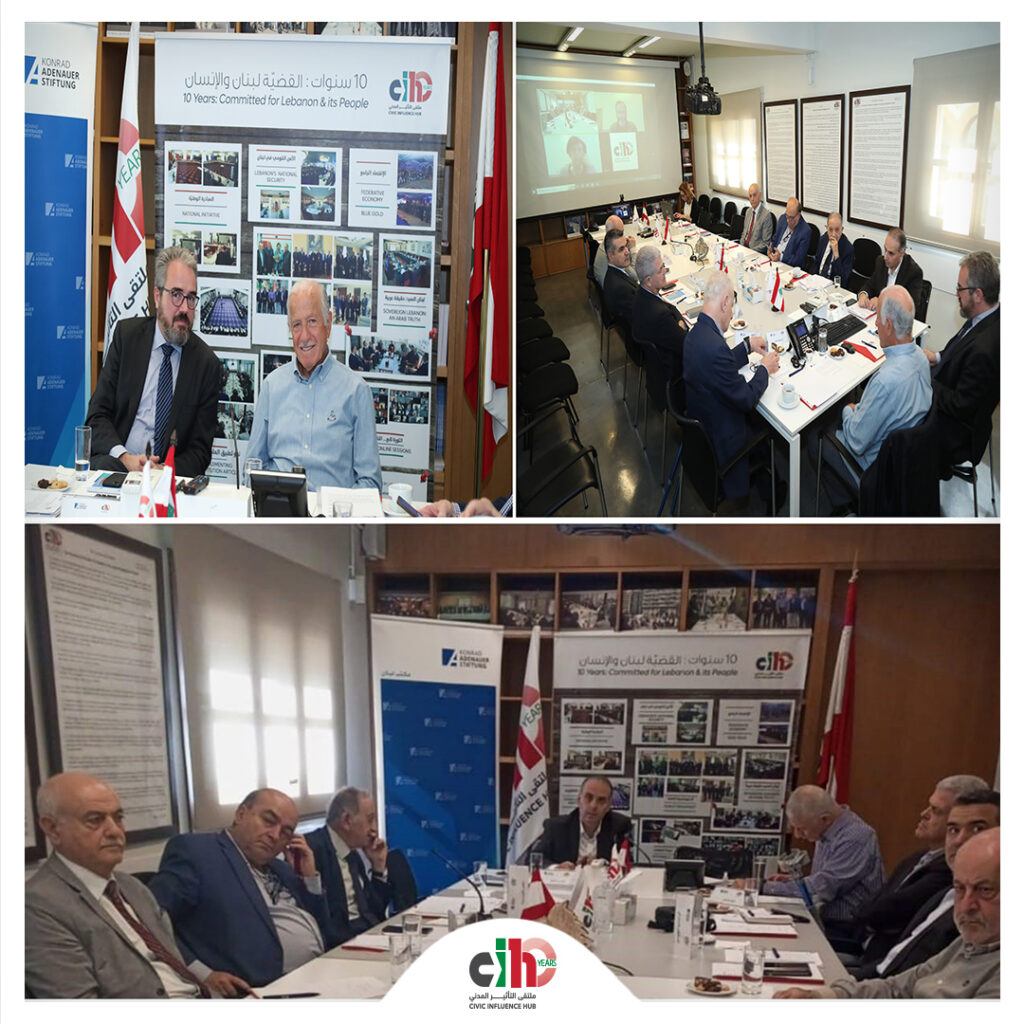
Second meeting 15-11-2022
Towards Citizenship and a Civic State – Lebanon’s Choices and Challenges
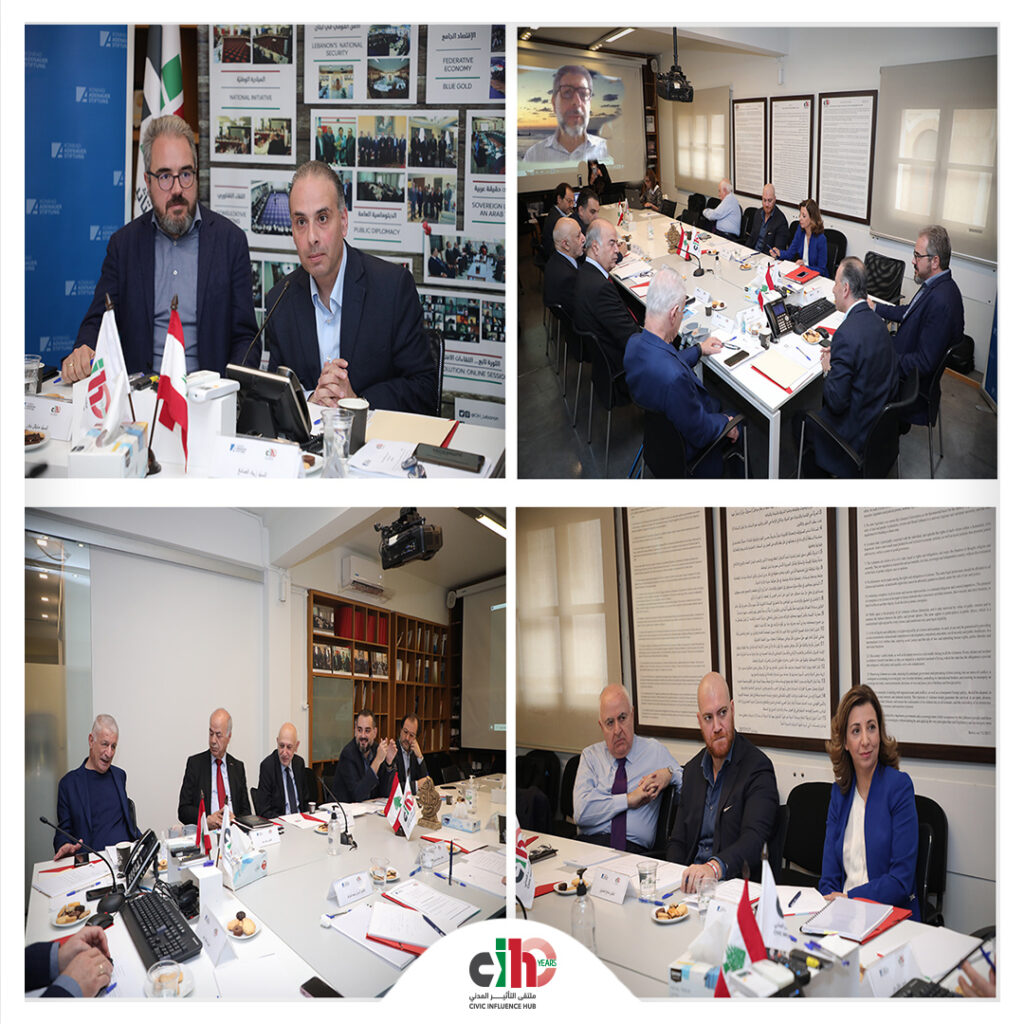
Third meeting 15-02-2023
Lebanon and the Geopolitical Transformations: Which Foreign Policy, What Role?
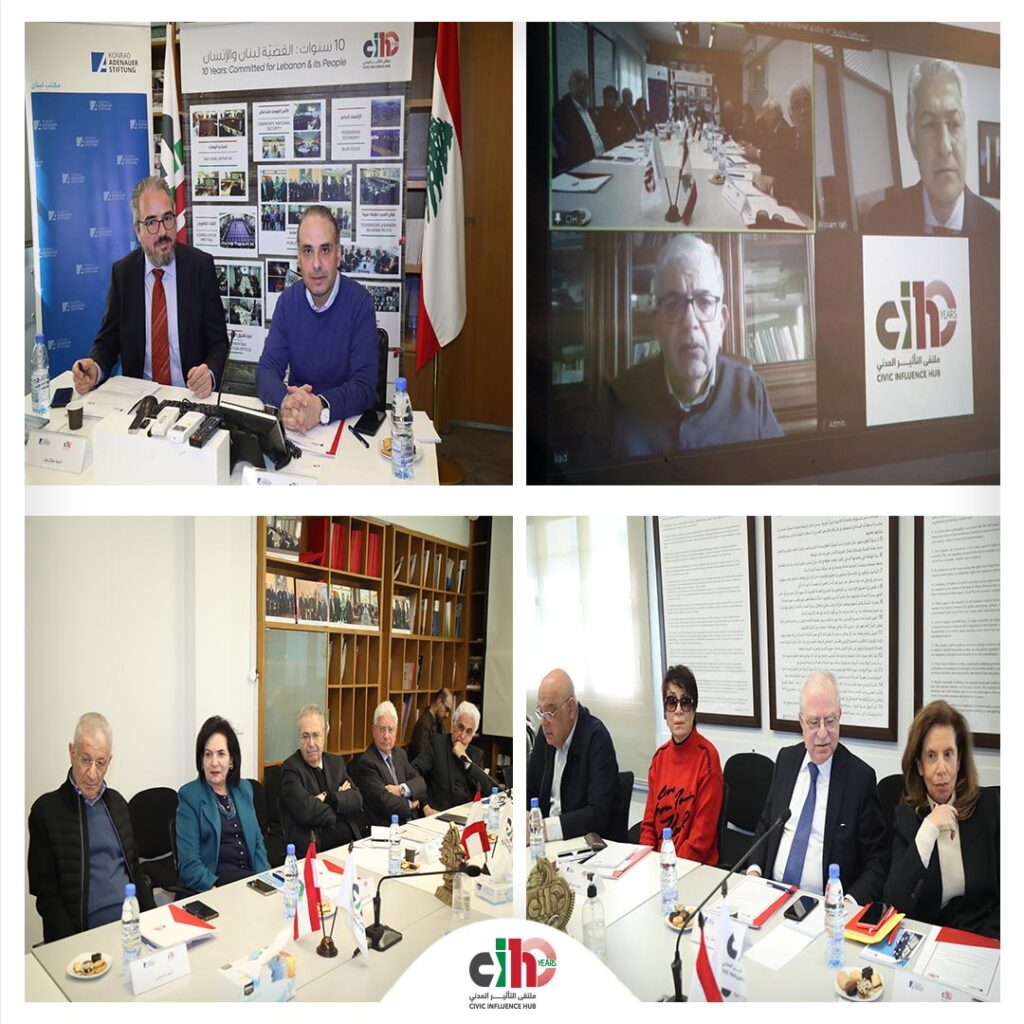
Fourth meeting 23-03-2023
Lebanon between the Defensive Strategy and the Dilemmas of Sovereignty
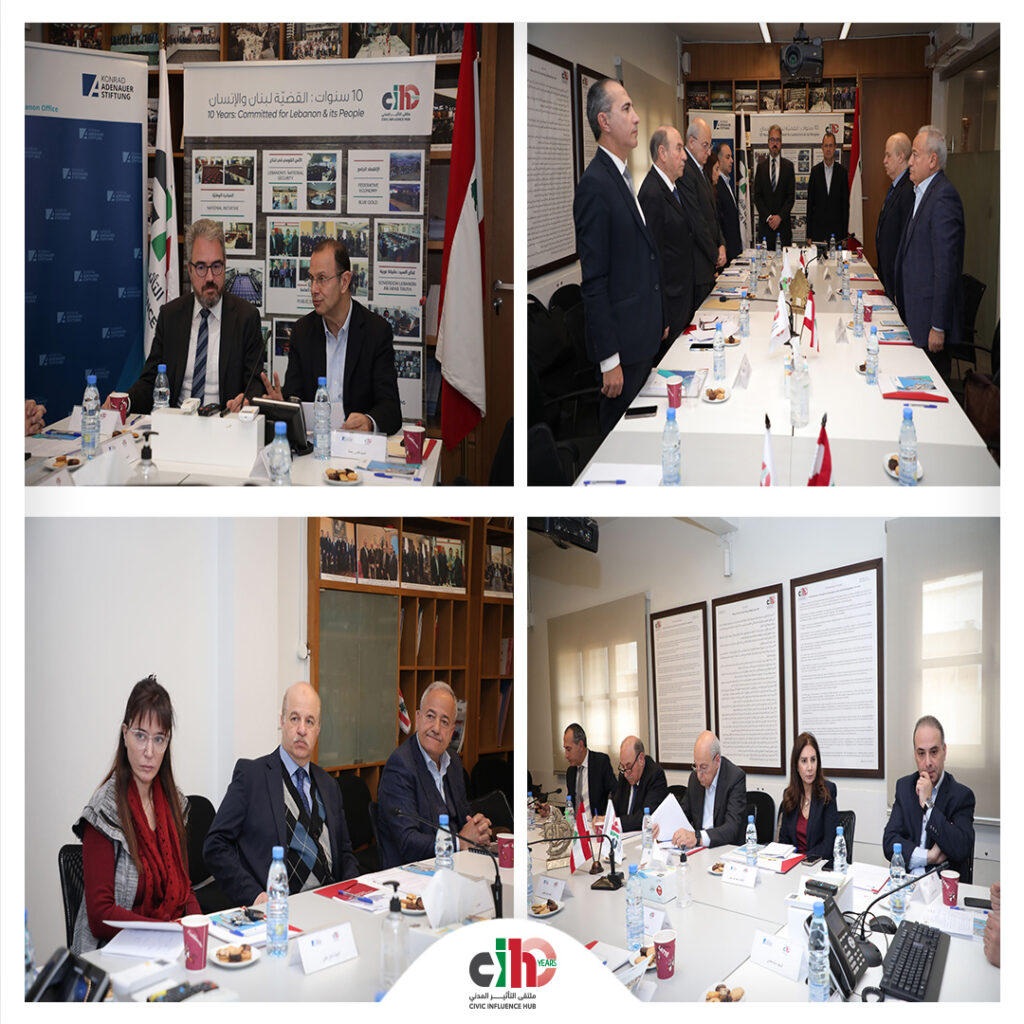
Fifth meeting 23-05-2023
Social Justice in Lebanon Reality, Challenges, and Stakes
